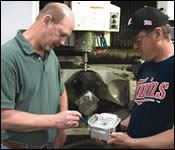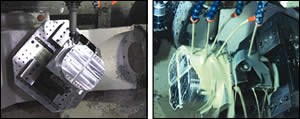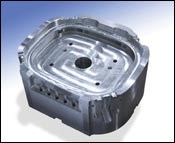Clamping System Enhances Productivity Of Five-Axis Machine
With Kurt Manufacturing Company's VB 5X100 Schenke 5.1 clamping system, this shop managed to use a single five-axis VMC to cut a mold that previously required two separate machining centers.
Share




Five-axis machining centers can bring a host of benefits to any shop, including reduced setup and cycle times and the added capability to machine features such as contours and swept surfaces. However, traditional workholding systems can limit the effectiveness of these machines by impeding the spindle head as the axes rotate and swivel to create complex features. This was the problem faced by Omnitool, Inc., a Minneapolis, Minnesota-based manufacturer of large thermoform molds and match metal trim dies.
Because conventional workholding limited Omnitool’s five-axis VMC to three axes, the company needed a second machining center to complete work on these molds. To maximize the capabilities of its five-axis machine, the company purchased the VB 5X100 Schenke 5.1 clamping system from Kurt Manufacturing Company (Minneapolis, Minnesota). As a result, the company now uses its VMC’s high speed, five-axis roughing and face-milling capabilities to create the intricate 3D features of custom mold cavities in a single setup on a single machine. In addition, the shop has reduced production time by 50 percent.
“The Kurt five-axis Schenke clamping system is ideal,” says Dave Korton, Omnitool foreman. “It frees up an HMC for other jobs while enabling us to really run the job fast on the VMC.”
Founded in 1976, Omnitool started out solving complex tolerance-centered structural engineering challenges in the aerospace industry. Through the years, the company transitioned to designing and fabricating thermoform tooling systems, primarily for the food-packaging industry. Today, it has long-term partnering relationships with major thermoform producers both nationally and internationally.
A key factor in Omnitool’s precision machine work is part runs, which vary from one to 200 parts. These relatively short runs mean setups can be both frequent and time-consuming, and machining centers often sit idle between jobs. Anything that can be done to reduce setups and increase machine utilization is given serious consideration.
“We look for new developments in the workholding area to improve our productivity,” Mr. Korton says. “Workholding is almost as important a consideration as the machining center itself. It can make a critical difference from one job to the next. The workholding has to suit the job as well as the machining center that’s doing the work.”
Omnitool programmer Mike Beckmann discovered the five-axis Schenke clamping system on Kurt’s Web site. According to Mr. Korton, the clamp paid for itself after the first two jobs. Unlike the company’s previous vises, which were more restricted as to the size of part they could clamp as well as the number of axes they could handle, Kurt’s Schenke clamping system is adjustable to handle virtually any clamping width. Thus, it is limited only by the size of the machine table. The two clamping jaws (one stationary and one movable) can be positioned at any desired distance from each other.
Actual clamping width for this system is 0.0787 inch to 9.291 inches (2 to 236 mm), which can be extended with optional spindle screws. Clamping depth is 0.315 inch (8 mm). Height above the machine table is 6.889 inches (175 mm), with extended-height options to 7.874 inches (200 mm) and 8.858 inches (225 mm).
Omnitool says the clamping system matches up well with the simultaneous five-axis capabilities of its Okuma MU 400AV VMC. The machine is equipped with a fixed spindle and trunnion table to improve versatility and performance. One of the first jobs on the Okuma to benefit from the new clamping system involved a 6061 aluminum part measuring 6 inches by 8 inches by 10 inches. Calling for 120 finished pieces, the job ran at a speed of 9,000 rpm with roughing and face-milling operations at 270 inches per minute.
The new clamping system is designed to mount on standard T-slot tables, location grid machine tables or custom fixtures. The company sets the system up as it would a standard vise on the Okuma’s trunnion table. Setup takes about the same amount of time (2 hours) as other systems, taking into account tweaking the setup and part program to avoid false starts and scrapped parts. The vise has allowed Omnitool to completely eliminate a second setup and machining operation.
Mr. Korton and his machine operators also comment on the system’s rigidity, which became apparent on the first project. “We ran the machine at 9,000 rpm with aggressive roughing and finishing cuts at 270 inches per minute,” Mr. Korton says. The reason for this rigidity is that the clamping system’s design eliminates jaw deflection and/or part misalignment during high speed operations. With the tension spindle located directly under the workpiece, the vise’s jaws do not flare out under tension, and the machine table does not distort, as is often the case with conventional workholding, the manufacturer says. Also, the system has been developed to handle a range of workpiece configurations, including blank, machined, round and irregular shapes with equal rigidity and repeatable accuracy.
“Parts are machined complete in one setup, so we reduce production time by as much as half,” Mr. Korton concludes. “We’re achieving required tolerances of ±0.0002 inch with no scrapped parts.”
Read Next
Setting Up the Building Blocks for a Digital Factory
Woodward Inc. spent over a year developing an API to connect machines to its digital factory. Caron Engineering’s MiConnect has cut most of this process while also granting the shop greater access to machine information.
Read More5 Rules of Thumb for Buying CNC Machine Tools
Use these tips to carefully plan your machine tool purchases and to avoid regretting your decision later.
Read MoreRegistration Now Open for the Precision Machining Technology Show (PMTS) 2025
The precision machining industry’s premier event returns to Cleveland, OH, April 1-3.
Read More






















.jpg;maxWidth=300;quality=90)










